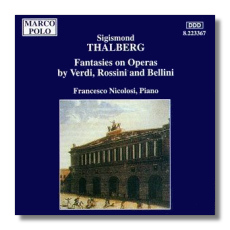
The Internet's Premier Classical Music Source
Related Links
- Latest Reviews
- More Reviews
-
By Composer
-
Collections
DVD & Blu-ray
Books
Concert Reviews
Articles/Interviews
Software
Audio
Search Amazon
Recommended Links
Site News
 CD Review
CD Review
Sigismond Thalberg

Fantasies on Themes from Italian Operas
- Fantasy on Rossini's "L'Assedio di Corinto ", Op. 3
- Fantasy on "Casta Diva" from Bellini's "Norma ", Op. 70
- Fantasy "Grand Concert" on Verdi's "Il Trovatore ", Op. 77
- Fantasy "Grand Concert" on Verdi's "La Traviata ", Op. 78
- Fantasy on Verdi's "Ballomaschera ", Op. 81
- Fantasy on Verdi's "Rigoletto ", Op. 82
Francesco Nicolosi, piano
Marco Polo 8.223367 DDD 60:47
The famous contest between Liszt and Thalberg – largely a creation of salon chatter, which seems to have been the early-nineteenth-century equivalent of today's tabloids – ended with Thalberg declared the first pianist of the world and Liszt being hailed as unique. That tactful decision is revised by the music, even if we confine ourselves to their operatic paraphrases: Liszt killed the thing he loved, as Wilde put it – that is, he made something entirely new out of the material he took from Mozart, Verdi et al. Thalberg did not have such a demanding creative talent. Paul Valéry, to bring in another writer, said that a lion consists of digested lambs; Thalberg's digestive system being less efficient than Liszt's, what we get here is more lamb.
That said, Thalberg's operatic fantasies present today's listener with classic examples of the tradition, and in those days where performance was the only medium of transmission, it was a very important tradition indeed. Thalberg's approach thoughout his paraphrases (and this is now the fourth in Marco Polo's series of his fantasies) is fairly consistent: he takes a string of the best-known melodies and submits them to fairly predictable decoration, most obviously for the slower tunes which he treats with his renowned 'third hand' technique, whereby he would pick out the theme with his thumbs in the centre of the keyboard and surround it with filigree arpeggios and other devices to fill out the textures above and below. End-to-end, which is not how they would have been heard in concert, of course, they get just a bit dull. Part of the reason is Thalberg's inherent conservatism, his classicism: he never really let himself go, there's no Lisztian swagger, so that the music always remains chaste, even when he making enormous technical demands of the pianist.
This pianist, Francesco Nicolosi, seems to be getting better through the course of Marco Polo's series: I wasn't entirely convinced by his playing at the outset, but here he seems to have found just the right balance between virtuosity and the demure, discreet Thalbergian style.
Copyright © Martin Anderson, 1995, 1998.
This review originally appeared in CD Review


















